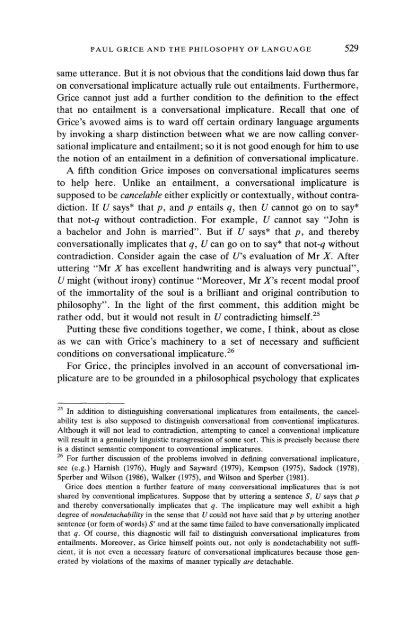Paul Grice and the philosophy of language
Paul Grice and the philosophy of language
Paul Grice and the philosophy of language
You also want an ePaper? Increase the reach of your titles
YUMPU automatically turns print PDFs into web optimized ePapers that Google loves.
PAUL GRICE AND THE PHILOSOPHY OF LANGUAGE 529<br />
same utterance. But it is not obvious that <strong>the</strong> conditions laid down thus far<br />
on conversational implicature actually rule out entailments. Fur<strong>the</strong>rmore,<br />
<strong>Grice</strong> cannot just add a fur<strong>the</strong>r condition to <strong>the</strong> definition to <strong>the</strong> effect<br />
that no entailment is a conversational implicature. Recall that one <strong>of</strong><br />
<strong>Grice</strong>'s avowed aims is to ward <strong>of</strong>f certain ordinary <strong>language</strong> arguments<br />
by invoking a sharp distinction between what we are now calling conversational<br />
implicature <strong>and</strong> entailment; so it is not good enough for him to use<br />
<strong>the</strong> notion <strong>of</strong> an entailment in a definition <strong>of</strong> conversational implicature.<br />
A fifth condition <strong>Grice</strong> imposes on conversational implicatures seems<br />
to help here. Unlike an entailment, a conversational implicature is<br />
supposed to be cancelable ei<strong>the</strong>r explicitly or contextually, without contradiction.<br />
If U says* that p, <strong>and</strong> p entails q, <strong>the</strong>n U cannot go on to say*<br />
that not-q without contradiction. For example, U cannot say "John is<br />
a bachelor <strong>and</strong> John is married". But if U says* that p, <strong>and</strong> <strong>the</strong>reby<br />
conversationally implicates that q, U can go on to say* that not-q without<br />
contradiction. Consider again <strong>the</strong> case <strong>of</strong> U's evaluation <strong>of</strong> Mr X. After<br />
uttering "Mr X has excellent h<strong>and</strong>writing <strong>and</strong> is always very punctual",<br />
U might (without irony) continue "Moreover, Mr X's recent modal pro<strong>of</strong><br />
<strong>of</strong> <strong>the</strong> immortality <strong>of</strong> <strong>the</strong> soul is a brilliant <strong>and</strong> original contribution to<br />
<strong>philosophy</strong>". In <strong>the</strong> light <strong>of</strong> <strong>the</strong> first comment, this addition might be<br />
ra<strong>the</strong>r odd, but it would not result in U contradicting himself. 2s<br />
Putting <strong>the</strong>se five conditions toge<strong>the</strong>r, we come, I think, about as close<br />
as we can with <strong>Grice</strong>'s machinery to a set <strong>of</strong> necessary <strong>and</strong> sufficient<br />
conditions on conversational implicature. 26<br />
For <strong>Grice</strong>, <strong>the</strong> principles involved in an account <strong>of</strong> conversational implicature<br />
are to be grounded in a philosophical psychology that explicates<br />
25 In addition to distinguishing conversational implicatures from entailments, <strong>the</strong> cancelability<br />
test is also supposed to distinguish conversational from conventional implicatures.<br />
Although it will not lead to contradiction, attempting to cancel a conventional implicature<br />
will result in a genuinely linguistic transgression <strong>of</strong> some sort. This is precisely because <strong>the</strong>re<br />
is a distinct semantic component to conventional implicatures.<br />
26 For fur<strong>the</strong>r discussion <strong>of</strong> <strong>the</strong> problems involved in defining conversational implicature,<br />
see (e.g.) Harnish (1976), Hugly <strong>and</strong> Sayward (1979), Kempson (1975), Sadock (1978),<br />
Sperber <strong>and</strong> Wilson (1986), Walker (1975), <strong>and</strong> Wilson <strong>and</strong> Sperber (1981).<br />
<strong>Grice</strong> does mention a fur<strong>the</strong>r feature <strong>of</strong> many conversational implicatures that is not<br />
shared by conventional implicatures. Suppose that by uttering a sentence S, U says that p<br />
<strong>and</strong> <strong>the</strong>reby conversationally implicates that q. The implicatnre may well exhibit a high<br />
degree <strong>of</strong> nondetachability in <strong>the</strong> sense that U could not have said that p by uttering ano<strong>the</strong>r<br />
sentence (or form <strong>of</strong> words) S' <strong>and</strong> at <strong>the</strong> same time failed to have conversationally implicated<br />
that q. Of course, this diagnostic will fail to distinguish conversational implicatures from<br />
entailments. Moreover, as <strong>Grice</strong> himself points out, not only is nondetachability not sufficient,<br />
it is not even a necessary feature <strong>of</strong> conversational implicatures because those generated<br />
by violations <strong>of</strong> <strong>the</strong> maxims <strong>of</strong> manner typically are detachable.














